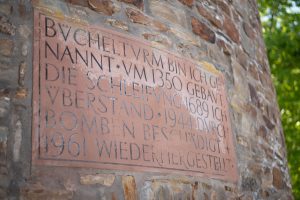Located in the province of Liege, Saint-Vith is today part of the German-speaking community of Belgium. However, between 1815 and 1945, the town was subject to territorial disputes and changed nationality several times.
Following the Congress of Vienna in 1815, St. Vith, formerly part of Luxembourg, became part of the Prussian province of Rhineland. The population speaks German and has a Germanic tradition. At the end of the First World War, the Treaty of Versailles offered the canton to Belgium, to repair the damage suffered by the country. It was then taken over by Nazi Germany within 10 days of the invasion of Belgium in 1940. Finally, Saint-Vith became Belgian again after the Second World War.

These changes led to many tragic situations, especially during the fighting. Indeed, many families were separated on both sides of the border, forcing brothers or cousins to fight against each other. Conflicts of loyalty were constant, forcing the population to choose between the Belgian country and the German homeland. During the Battle of the Bulge, on 23 December 1944, after several days of fighting, the Germans gained the upper hand and the Americans retreated west of the Salm River. The Allies then bombed Saint-Vith intensively on 25 and 26 December 1944. Almost 600 buildings were destroyed or heavily damaged, i.e. 95% of the town. The total American losses were also very heavy: 12,500 killed, wounded, captured or missing.
In 2004, 60 years after the Ardennes offensive, Saint-Vith was awarded the title of martyrdom town by the Belgian government.
Today, the only remnant of the medieval fortifications of St. Vith that was not destroyed is the Büchel Tower. It was the only building to survive the bombing in 1944. This is why it has since become the symbol of the resistance of Saint-Vith, and more generally, of the Province of Liege.


Discover Saint-Vith during guided tours available for groups by reservation or individually via free maps. Every Sunday there is also an appointment for guided tours. They are available in English, French, Dutch and German.

For all reservations and information, please contact the Tourist Office of Saint-Vith.